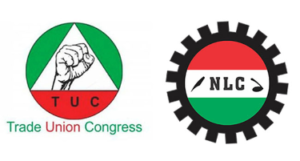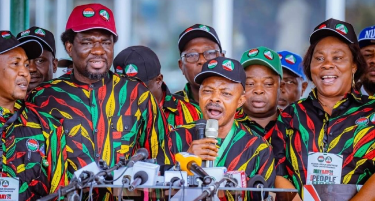After a protracted four-hour meeting with the leadership of the National Assembly on Sunday evening in Abuja, the leadership of the Organised Labour has resolutely declared that the nationwide industrial action will proceed as planned on Monday, June 3, 2024. Despite the intense negotiations, the labour unions remain steadfast in their decision to strike.
Festus Osifo, speaking on behalf of the labour unions after the meeting, made it clear that they did not have the authority to unilaterally call off the strike. “For now, we don’t have the power to call off the strike. Tomorrow morning, the strike will kick off as we take their (NASS) plea asking us to call off the strike to our various organs,” Osifo stated, underscoring the union’s commitment to their cause.
Earlier, Osifo, President of the Trade Union Congress (TUC), along with Joe Ajaero, President of the Nigeria Labour Congress (NLC), met with Senate President Godswill Akpabio and Speaker of the House of Representatives Tajudeen Abbas.
This meeting was part of a series of last-minute efforts by the legislators to persuade the aggrieved workers to reconsider their planned industrial action. The meeting was intended to “avert the impending industrial action,” which is anticipated to have severe repercussions on the populace and economy.
The decision by the Organised Labour to move forward with the strike follows a deadlock in negotiations with the Federal Government over a new national minimum wage and the reversal of the recent hike in electricity tariffs.
The urgency and gravity of the situation were highlighted by the presence of the Chairmen of the Senate and House Committees on Labour, Employment and Productivity, Diket Plang, and Adegboyega Adefarati, respectively.
 Labour unions have been vocal about the inadequacy of the current minimum wage of ₦30,000, which they argue is insufficient to meet the needs of the average Nigerian worker. They have also lamented the fact that not all state governors are adhering to the current wage award, which expired in April 2024. This wage, set by the Minimum Wage Act of 2019, was intended to be reviewed every five years to keep pace with the contemporary economic demands of workers.
Labour unions have been vocal about the inadequacy of the current minimum wage of ₦30,000, which they argue is insufficient to meet the needs of the average Nigerian worker. They have also lamented the fact that not all state governors are adhering to the current wage award, which expired in April 2024. This wage, set by the Minimum Wage Act of 2019, was intended to be reviewed every five years to keep pace with the contemporary economic demands of workers.
The unions had issued a deadline to the Federal Government to agree on a new minimum wage by May 31. When this deadline passed without an agreement, the unions declared a nationwide strike to commence on June 3, 2024.
The government’s inability to reach a consensus with the unions has been a point of contention, especially given the recent increase in electricity tariffs, which has further strained the finances of many Nigerian workers.
During the negotiations, Labour rejected several offers from the government, the latest being ₦60,000. Both the TUC and the NLC pulled out of negotiations, steadfastly demanding a new minimum wage of ₦497,000.
This significant increase reflects the unions’ stance on what they believe is necessary to ensure a decent standard of living for Nigerian workers in the face of rising inflation and cost of living.
The insistence on such a high figure, nearly eight times the current minimum wage, underscores the deep frustrations and economic pressures faced by workers across Nigeria. The unions argue that the government’s proposals have been insufficient and that a substantial increase is necessary to address the real economic challenges faced by workers.
As the nation braces for the impact of the strike, the Organised Labour’s determination highlights the broader struggles within the Nigerian economy. The impending industrial action is set to disrupt various sectors, adding further strain to an already fragile economic environment. This move, however, is seen by the unions as a necessary step to push for long-overdue reforms and to ensure that the voices of Nigerian workers are heard and addressed.
The coming days will undoubtedly be challenging for both the government and the citizens as the strike takes effect. The labour unions’ firm stance is a clear message to the authorities that substantial changes are needed to improve the livelihood of workers and to create a more equitable economic landscape in Nigeria.




